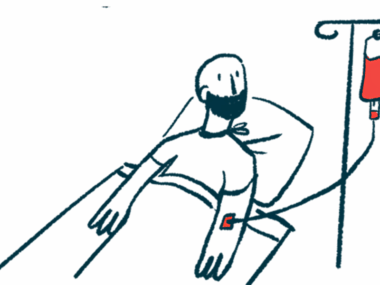Ultomiris Favored for Approval in EU for AChR-positive Generalized MG
Committee's recommendation covers about 80% of gMG patients
Written by |
Ultomiris (ravulizumab) has been recommended for approval in the European Union (EU) as an add-on therapy for most adults with generalized myasthenia gravis (gMG).
The recommendation by the Committee for Medicinal Products for Human Use (CHMP), an arm of the European Medicines Agency, specifically covers gMG patients who are positive for antibodies against the acetylcholine receptor (AChR) — about 80% of cases.
The European Commission (EC), which makes final decisions on therapy approval and usually accepts the committee’s opinion, will now review the recommendation and decide whether to approve Ultomiris.
If approved, Ultomiris — developed by Alexion Pharmaceuticals, now part of AstraZeneca — will be the first and only long-acting C5 complement inhibitor available to gMG patients with anti-AChR antibodies in the EU.
Ultomiris is Alexion’s successor to Soliris (eculizumab) — also approved for gMG and given every other week — and allows for a less-frequent eight-week dosing schedule after a loading phase. Both therapies block the complement C5 protein, preventing the overactivation of the complement system, part of the body’s immune system, that is thought to drive gMG.
However, Ultomiris remains active for longer in the body, requiring less frequent into-the-vein administrations. As such, it is expected to lower the burden and overall healthcare costs for patients.
“This recommendation is a major milestone in our commitment to help a broader range of gMG patients, including those with milder symptoms, and expand access to Ultomiris,” Marc Dunoyer, Alexion’s CEO, said in an AstraZeneca press release.
“As we listen to the patient community, we’re focused on understanding and meeting the needs of gMG patients, providing them with effective and accessible treatment options, and the positive opinion is a great step forward,” Dunoyer added.
Ultomiris approved by U.S. FDA
The U.S. Food and Drug Administration (FDA) approved Ultomiris in April for adults with gMG who are positive for antibodies against AChR. Regulatory reviews are ongoing in additional countries, including Japan.
The CHMP’s recommendation and FDA’s approval were based on data from the global Phase 3 CHAMPION-MG clinical trial (NCT03920293). A total of 175 adults with AChR-positive gMG who had never been treated with a complement suppressor were randomly assigned to receive either Ultomiris or a placebo for 26 weeks, or about half a year.
The results showed that Ultomiris was superior to a placebo at lessening symptom severity, as measured by numerous measures of disease activity. The therapy’s benefits were observed as soon as one week after starting treatment.
Treated patients also showed a trend toward better health-related quality of life and less fatigue relative to those given a placebo.
Data from the study’s ongoing open-label extension study, in which all participants were given Ultomiris, showed the therapy continued to significantly reduce symptoms over one year.
The therapy was generally well-tolerated and the safety data was consistent with Ultomiris Phase 3 trials in other disorders. The most common side effects included diarrhea, upper respiratory tract infection, common cold, and headache.
Serious adverse events were reported in two patients on Ultomiris and four on placebo. Two Ultomiris-treated patients died during the trial — one due to COVID-19 and the other after a bleeding in the brain.
“gMG is a rare and complex disorder that requires early, consistent and reliable intervention,” said Renato Mantegazza, MD, at Fondazione IRCCS Istituto Neurologico Carlo Besta, in Milan, Italy, and one of CHAMPION-MG’s researchers.
“This positive recommendation offers hope to the community for an effective long-acting option that will require fewer treatments each year and help improve disease management,” Mantegazza added.
Ultomiris is also approved as a treatment for two other autoimmune conditions, atypical hemolytic uremic syndrome and paroxysmal nocturnal hemoglobinuria.







Leave a comment
Fill in the required fields to post. Your email address will not be published.